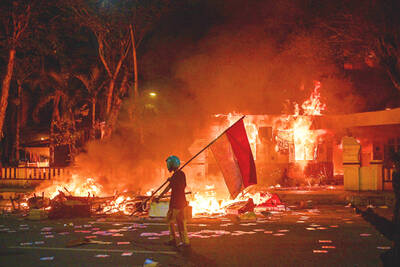The London Bridge is not falling down, despite a British tabloid saying the western Arizona tourist attraction could be bulldozed to make way for drug tourism.
Lake Havasu City officials heard about the story in the Sun newspaper after a resident from a London suburb showed them a copy of the tabloid.
They say it was a slap in the face, particularly when more than US$600,000 in bridge improvements are planned for this summer. They demanded a retraction and an apology from the newspaper.
The bridge, which spans a channel between the shoreline and an island in Lake Havasu, was sold by the British government in 1968 to Robert McCullough, the founder of Lake Havasu City. The bridge was dismantled in London, transported to Lake Havasu and reassembled over a three-year period.
It is the only bridge leading to the island, where boats launch on Lake Havasu and one of the state’s major tourist attractions. About 12,000 vehicles cross it daily.
The article in the Sun said the bridge is cracking and that the city is so desperate for tourism dollars that it has decided to create a haven for marijuana users called Hemped in Havasu. Marijuana is illegal in Arizona, except for the treatment of certain medical conditions.
“From a cultural standpoint, not only have we been ripped in terms of our caretaking for this heritage monument, but for the adherence to the laws of Arizona,” Lake Havasu City Convention and Visitors Bureau’s Doug Traub said.
The city gained a partial victory with the article no longer appearing on the Sun’s Web site, Traub said.
An attorney for the tabloid wrote to Traub saying editors were reviewing what he contends are several inaccuracies.
“It’s not a great situation to be in,” Traub said on Tuesday. “On one hand, we know we can’t believe what’s in these publications and take them seriously. But there are a lot of people who take it with less than a grain of salt.”
Sylvia Want, originally from Hampton on the outskirts of London, said she began receiving calls from friends and relatives in Britain shortly after the article came out, asking if it was true. She took a copy to city officials, afraid it would hurt tourism and create the impression that Lake Havasu City would become a mecca for drug users.
While the English-style village surrounding the bridge is in need of work, she said the bridge that her brother-in-law helped construct and that lured her to Lake Havasu is beautiful.
The Convention and Visitors Bureau is offering anyone with a UK passport a thumbnail-sized piece of granite from the bridge and a brochure to let people back home know the bridge is not going anywhere.

Australia has announced an agreement with the tiny Pacific nation Nauru enabling it to send hundreds of immigrants to the barren island. The deal affects more than 220 immigrants in Australia, including some convicted of serious crimes. Australian Minister of Home Affairs Tony Burke signed the memorandum of understanding on a visit to Nauru, the government said in a statement on Friday. “It contains undertakings for the proper treatment and long-term residence of people who have no legal right to stay in Australia, to be received in Nauru,” it said. “Australia will provide funding to underpin this arrangement and support Nauru’s long-term economic

‘NEO-NAZIS’: A minister described the rally as ‘spreading hate’ and ‘dividing our communities,’ adding that it had been organized and promoted by far-right groups Thousands of Australians joined anti-immigration rallies across the country yesterday that the center-left government condemned, saying they sought to spread hate and were linked to neo-Nazis. “March for Australia” rallies against immigration were held in Sydney, and other state capitals and regional centers, according to the group’s Web site. “Mass migration has torn at the bonds that held our communities together,” the Web site said. The group posted on X on Saturday that the rallies aimed to do “what the mainstream politicians never have the courage to do: demand an end to mass immigration.” The group also said it was concerned about culture,

ANGER: Unrest worsened after a taxi driver was killed by a police vehicle on Thursday, as protesters set alight government buildings across the nation Protests worsened overnight across major cities of Indonesia, far beyond the capital, Jakarta, as demonstrators defied Indonesian President Prabowo Subianto’s call for calm. The most serious unrest was seen in the eastern city of Makassar, while protests also unfolded in Bandung, Surabaya, Solo and Yogyakarta. By yesterday morning, crowds had dispersed in Jakarta. Troops patrolled the streets with tactical vehicles and helped civilians clear trash, although smoke was still rising in various protest sites. Three people died and five were injured in Makassar when protesters set fire to the regional parliament building during a plenary session on Friday evening, according to

CRACKDOWN: The Indonesian president vowed to clamp down on ‘treason and terrorism,’ while acceding to some protest demands to revoke lawmaker benefits Protests in Indonesia over rising living costs and inequality intensified overnight, prompting Indonesian President Prabowo Subianto to cancel a planned trip to China, while demonstrators reportedly targeted the homes of the finance minister and several lawmakers. Rioters entered Indonesian Minister of Finance Sri Mulyani Indrawati’s residence near Jakarta early yesterday, but were repelled by armed forces personnel, Kompas reported. Items were taken from the homes of lawmaker Ahmad Sahroni and two others, according to Detik.com. The reports of looting could not be independently verified, and the finance ministry has not responded to requests for comment. The protests were sparked by outrage over